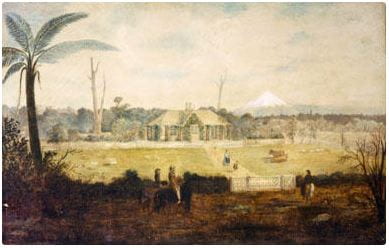‘A night or two ago I dreamed that I said it is a long time since I called at my Father’s and your parents and that I was determined I would go the next day. I awoke to disappointment wishing I might never dream again.’ (Sarah Harris #15)
‘Will you in the next send me a Phial bottle of mastic varnish & if you can afford it I should be glad of a set of Guitar strings which will cost from 4 to 5 shillings. I have made a guitar, Music being our only amusement. The evenings are long, lights bad for drawing and books only for those who can get them.’ (Edwin Harris #16)
‘I have written this letter with uncertain ink and a more vile steel pen that will only mark by fits and starts as the very idea of returning to England suggested to me by Miss Hill’s letter has so upset me that I fear my letter must be very incoherent at least very unconnected.’ (Edwin Harris #19)
‘I believe I must conclude by telling 5 o’clock p.m. Corbyn’s driving in at the gate, Emily at crochet work, Kate looking to see what is in the cart for the house, Frances feeding the calf, Mary the pet lamb, Augusta and Ellen making a garland of daisies and roses for the lamb’s neck, Papa reading Sharp’s Magazine, Mamma writing.’ (Sarah Harris #31)
The voices of Edwin and Sarah Harris rise from the pages of letters sent from New Zealand to England, detailing the transplanted life of emigrants unsure of the move they have made or the future promised by those seeking to profit by investment in land not legally theirs to sell. The Harrises, middle-class professionals, arrived in Taranaki on the William Bryan as Plymouth Company surveyor Frederick Alonso Carrington and his team were laying out the grid that would become the town of New Plymouth. Everything went wrong for the Harrises. They had lost money in England. A daughter born prematurely on the voyage died five days later and was buried at sea off Van Dieman’s Land. The fire that destroyed their raupō whare on the New Plymouth beachfront also ruined Edwin’s surveying instruments, and the letter of introduction to Lieutenant-Governor Hobson that might have given Edwin surveying work never reached Auckland. At times the Harrises, like others in the settlement, were close to starvation because sea captains were reluctant to land stores from the open roadstead. The trouble over bad land deals between Te Ātiawa and the New Zealand Company set tāngata whenua and tauiwi at odds that wrecked any chance of permanent understanding between ancestral owners and newcomers.
Family members weighed in from England: ‘he is a skilful surveyor, and neat draughtsman, a very fair artist, and has had a good education’ (brother-in-law JM Rendel). ‘If you can get on without Capt. Hobson I shall be just as well pleased’ (sister Catherine Jane Rendel). ‘I do not think you are open enough in expressing what you feel. Do you doubt the continued interest of us all? You ought not to do so’ (sister Augusta Dobson). ‘Kate and Rendel were pleased with the account of the country though not with your prospects as they wished it had been differently arranged and you had gone by the London company’s vessel as you would then have been in Captain Hobson’s way’ (sister Ellen Harris).
And through it all Emily Cumming Harris was growing up colonial, four years old when the William Bryan landed the family on the beach at Moturoa in 1841, 16 at the time of Sarah’s 1853 letter. The daughter lensed in the words of her mother is recognisable as the writer and artist to come. ‘She was a very pretty child with large blue eyes, could read easy words at two years old.’ ‘Emily was not ill & was quite a pet on board she would make use of long words & talk a great deal to the gentlemen to their great amusement.’ ‘Emily I know you are most interested about. She is much grown, the Buff dress except its being too long (as she wears her clothes very short), fits her exactly. She is now a little useful in taking care of Baby. She can sew a little but not read though strange to say with more facility than her brother and will sit beside him for hours to hear him read which he does very well. Her remembrance of dear Aunt Emma is kept alive by our often talking of you. She is a very intelligent child.’ ‘I did manage to have Mr and Mrs Bolland to take a friendly tea and we should have made them very comfortable but for a sad accident of Emily’s. You must know I had a month before bought an earthenware set of tea things 25 shillings. On this occasion I had to borrow a tea tray which Miss Emily was so desirous of looking at that she managed to upset the whole paraphernalia just before my visitors arrived. We saved two cups and saucers, milk cup and teapot without the handle.’ ‘Emily feels quite astonished that I never saw your friends the Streets. She says what a strong friendship must exist between you, to extend it to a sister sixteen thousand miles away.’
The Family Songbook reconstructs the conditions and contexts of the Harrises life in Taranaki before the war of 1860 changed their circumstances irrevocably. The 32 letters and memoir extracts presented here paint a vivid backdrop against which Emily Harris, her brother and six surviving sisters learned to inhabit their world of difference and day to day precarity.

Lead writer: Michele Leggott
Research support: Makyla Curtis, Betty Davis, Brianna Vincent